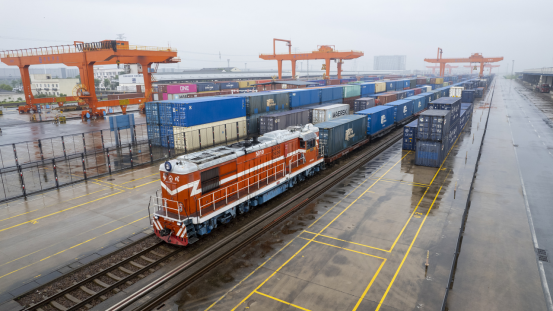HAN Meng: China-Hungary cooperation bearing rich fruit

The China-Europe freight train sets off for Hungary loaded with supplies from Jinhua, Zhejiang Province, May 5, 2024./ CFP
This year marks the 75th anniversary of the establishment of diplomatic relations between China and Hungary. The two nations have established strong friendship and mutual trust for a long time.
In particular, Hungary launched the "Opening East" initiative in 2010. It has strengthened pragmatic collaboration with Eastern nations, notably China, while fortifying diplomatic and economic ties with American and European nations.
In 2013, China proposed the Belt and Road Initiative (BRI), and Hungary responded favorably. In June 2015, Hungary became the first European country to join the BRI. The successful integration of the "Opening East" policy and the BRI has not only enhanced the quality and efficiency of cooperation between the two nations, but also showcased a positive example, allowing Europe to maintain and advance its objective and reasonable stance towards China.
Looking back over the past nine years, under the framework of the BRI, China and Hungary have achieved significant progress in cooperation in numerous domains, with economic and commercial cooperation being one of the most notable. In 2023, trade between China and Hungary reached $14.52 billion, up 79.9 percent from 2015. China's exports to Hungary were $9.8 billion, while its imports from Hungary were $4.73 billion, representing an 88.5 percent and 64.5 percent rise, respectively, over 2015.
At present, China has become Hungary's most important trading partner outside Europe. Despite the negative consequences of geopolitics, energy crisis, global supply chain instability and inflation, China and Hungary have maintained a positive development momentum and provided a significant push to their respective economic growth. At the same time, Hungary is also China's largest investment destination in Central and Eastern European (CEE) countries.
According to data released by the Hungarian Investment Promotion Agency, the total foreign direct investment in Hungary in 2023 exceeded 13 billion euros ($13.95 billion), with direct investment from China amounting to 7.6 billion euros (58 percent). A large number of Chinese-funded new energy businesses, including Contemporary Amperex Technology Co., Limited, BYD Company Limited, and EVE Energy Co., Ltd, have established factories in Hungary. This has not only created favorable conditions for Chinese-related products to further expand within the European market, but also strengthened Hungary's position in the global industrial chain and generated a large number of job opportunities, thereby providing strong support for the transformation of Hungary's economic structure and the improvement of people's livelihoods and welfare.
The cooperative partnership between China and Hungary is not only evident in the mutually beneficial and win-win results between the two nations, but has also exemplified the enduring friendship and commitment to multilateralism. Hungary has consistently pursued an independent foreign policy and maintained a friendly stance towards China. In addition, Hungary was the first European country to sign the memorandum of understanding over China's BRI.
China and Hungary have achieved numerous "firsts", with Hungary playing a pivotal role among CEE countries, as well as within the European Union. For example, Hungary was the first country to establish and launch the "Belt and Road" working group mechanism with China, the first CEE country to establish a RMB clearing bank, and the first European country to open a bilingual national school offering education in both Hungarian and Chinese.
Han meng, assistant research fellow at Institute of European Studies of the Chinese Academy of Social Sciences.
The article was originally published in CGTN on May 9, 2024. The article has been authorized.
